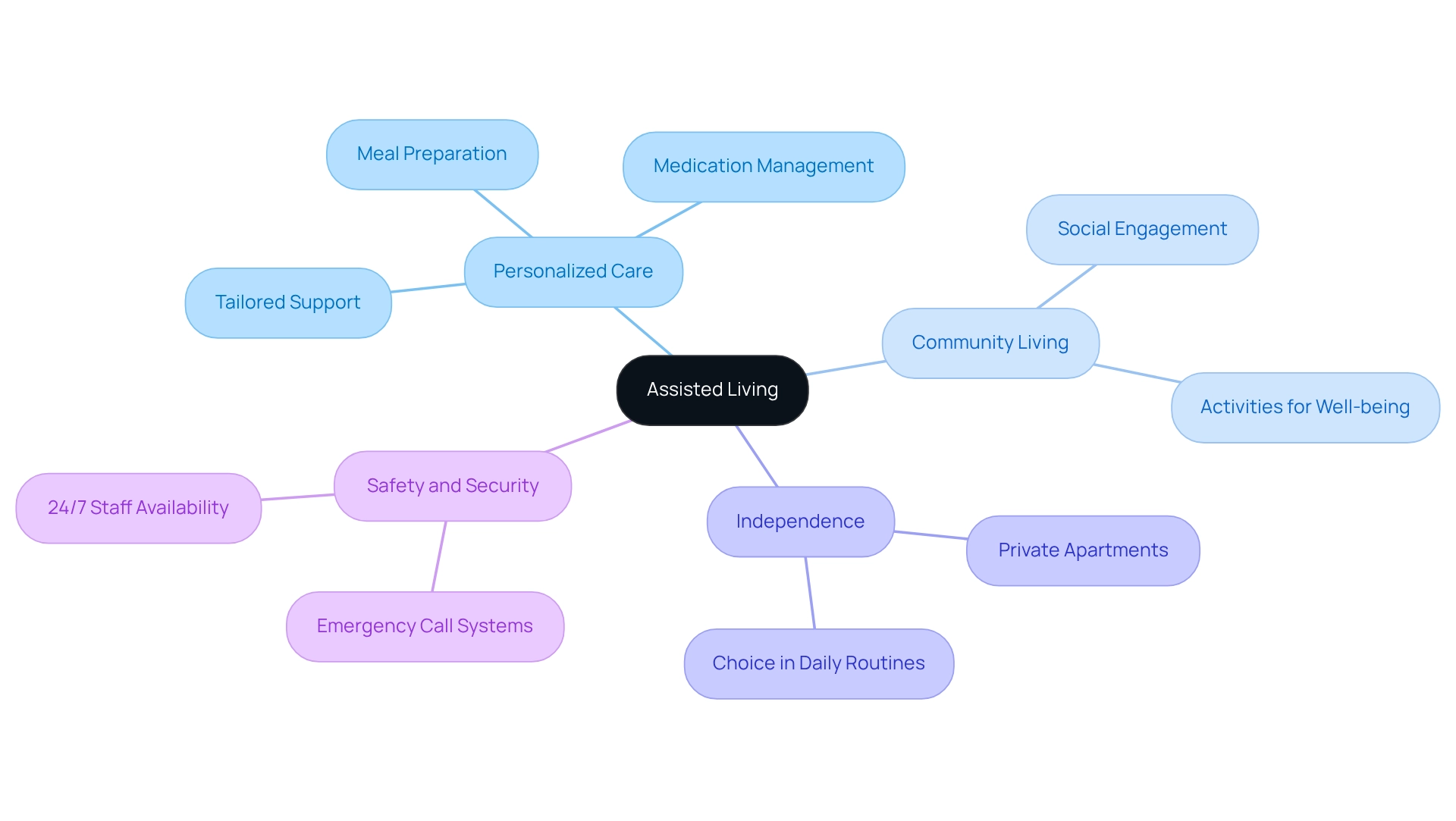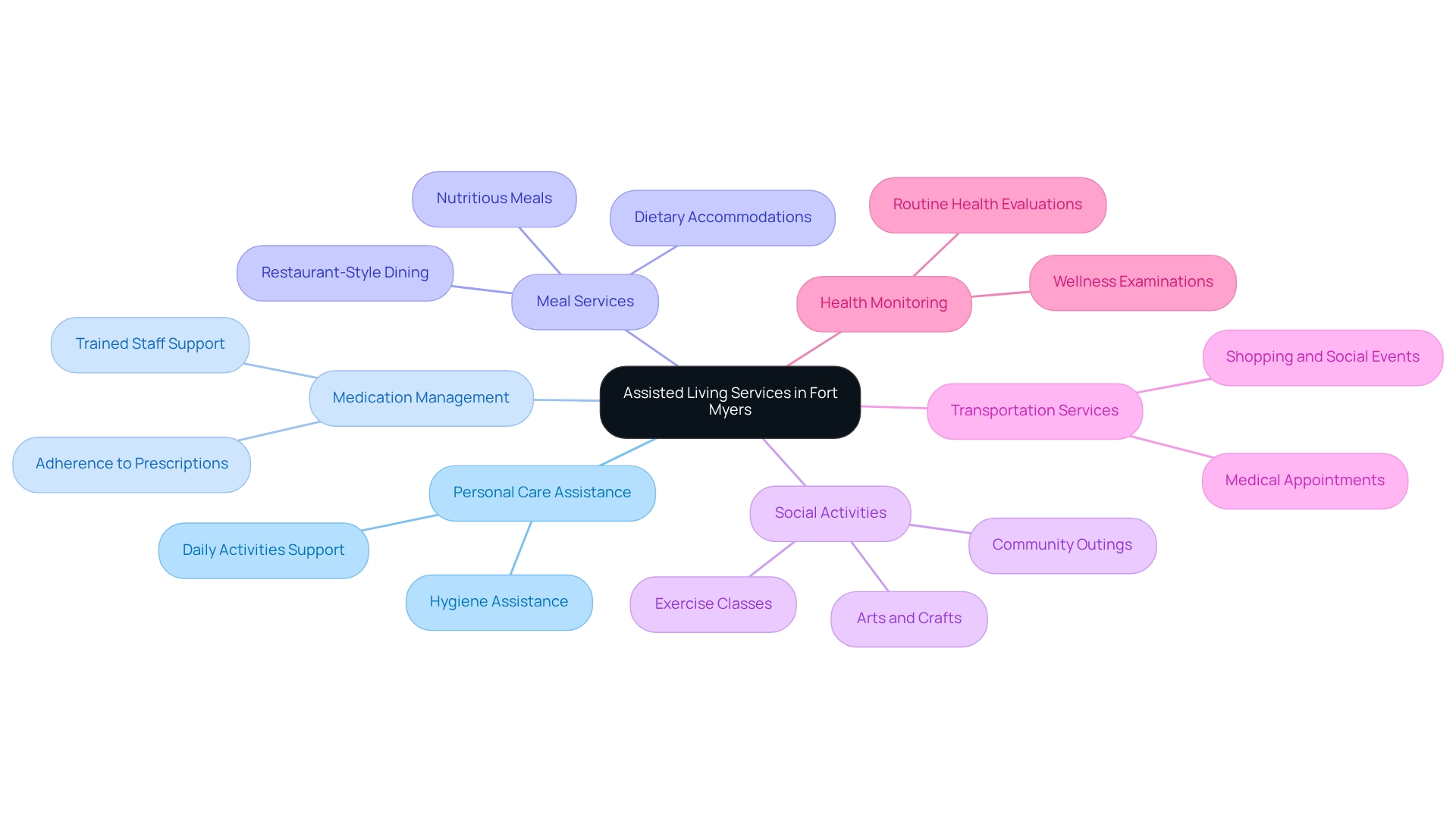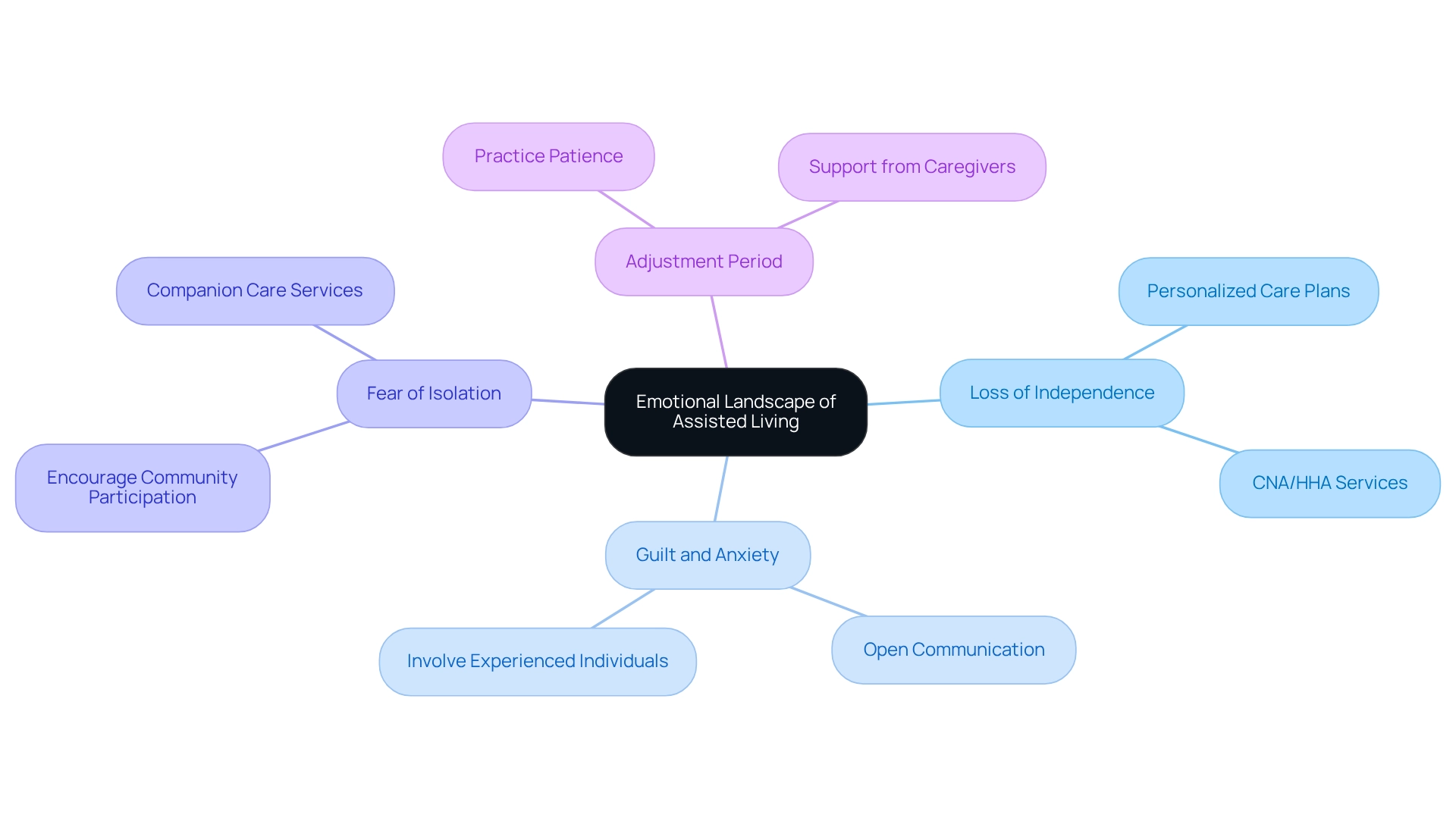Overview
Assisted living in Fort Myers offers vital support for older adults who need assistance with daily tasks while cherishing their independence. This nurturing environment emphasizes personalized care, community living, and safety, ensuring that each resident feels valued.
These facilities enhance the quality of life for residents through tailored services and social engagement, addressing not only their needs but also the emotional well-being of their families. It’s important to consider how these transitions can be challenging, and this supportive atmosphere is designed to ease those concerns for both seniors and their loved ones.
In addition, the focus on community helps foster connections and friendships that can greatly enrich the lives of residents. We understand that choosing the right care is a significant decision, and we’re here to provide guidance and support every step of the way.
If you’re looking for a place where your comfort is our priority, reach out today to learn more about how assisted living can make a positive difference in your life or that of a loved one.
Introduction
As the population of seniors continues to grow, the demand for assisted living facilities rises, offering a crucial lifeline for those who need support with daily activities yet wish to maintain their independence. These communities are not just about care; they represent a blend of personalized assistance, social engagement, and safety that enhances the quality of life for residents.
With tailored services ranging from personal care and medication management to vibrant social activities, assisted living facilities create environments where seniors can truly thrive. Understanding the nuances of this option is essential for families navigating the emotional landscape of transition. It ensures that their loved ones receive compassionate care in a supportive community.
As the future of senior care evolves, the importance of assisted living becomes ever more significant, promising a dignified and fulfilling lifestyle for those who choose this path. We’re here for you, ready to support you and your family in this important decision.
Define Assisted Living: Key Concepts and Importance
Assisted living Fort Myers serves as a vital residential option for older adults who need help with daily tasks but do not require the extensive medical care provided in nursing facilities. Understanding this choice is crucial for families seeking the best support for their loved ones in assisted living Fort Myers. Here are some key concepts to consider:
- Personalized Care: Residents receive tailored support that meets their unique needs, including assistance with bathing, dressing, medication management, and meal preparation. This individualized approach is essential, as studies indicate that personalized support significantly enhances residents’ quality of life. Best Care Nurses Registry exemplifies this commitment by providing caregivers who are thoroughly screened and dedicated to excellence, ensuring that your loved one enjoys healthy, meaningful days at home.
- Community Living: Assisted living facilities foster a strong sense of community, encouraging residents to engage socially and partake in activities that promote mental and emotional well-being. This communal atmosphere not only alleviates loneliness but also nurtures a vibrant lifestyle, supported by the companionship offered through professional caregiving services.
- Independence: While assistance is readily available, residents experience a degree of independence, residing in private apartments or suites and making choices about their daily routines. This balance of support and autonomy is essential for maintaining dignity and self-worth, which Best Care Nurses Registry aims to enhance through its personalized assistance solutions.
- Safety and Security: These facilities prioritize safety, often featuring emergency call systems, secure entrances, and staff available 24/7 to respond to emergencies. Such measures provide peace of mind for both residents and their families, alleviating stress and anxiety, knowing that professional caregivers are delivering high-quality support.
Recognizing these aspects is vital for families contemplating supportive housing as a viable option for their relatives. With the U.S. projected to need nearly 775,000 new supportive housing units by 2030 and 986,000 by 2040, the importance of these establishments in providing quality support is greater than ever. Typically, residents remain in supportive housing for about 22 months, highlighting the transitional nature of these communities and the ongoing need for individualized, compassionate support. Additionally, the revenue per assisted living unit in the U.S. for Q4 2022 is reported at $60,712, underscoring the financial viability of these services. As Matthew Clem, a registered nurse, notes, “The elder support market is typically categorized into three segments: adult day assistance, home support, and institutional service offerings.” This segmentation highlights the diverse options available to families seeking care solutions. Furthermore, advocacy initiatives, such as those from HavenCo, aim to promote beneficial policies that encourage investments in elder housing, emphasizing the importance of a nurturing environment for the development of care facilities.
For families considering assisted living Fort Myers, it is crucial to recognize the risks faced by seniors without caregiver services, including health decline, poor nutrition, and social isolation. Best Care Nurses Registry is devoted to ensuring consistent support and fostering strong caregiver-client relationships, providing reassurance for families. To learn more about personalized assistance solutions, reach out to Best Care Nurses Registry today. Your comfort is our priority.

Explore Assisted Living Services in Fort Myers: What to Expect
In Fort Myers, assisted living Fort Myers facilities offer a comprehensive range of services tailored to meet the unique needs of older adults. These services are not just about care; they are about ensuring dignity, comfort, and a fulfilling life.
-
Personal Care Assistance: Support with daily activities such as bathing, grooming, and dressing helps residents maintain their dignity and comfort. Assistance with personal hygiene is crucial, as it helps prevent infections and promotes overall health.
-
Medication Management: Trained staff assist residents in managing their medications, ensuring adherence to prescribed dosages and schedules, which is vital for health maintenance. As local consultant Susan Adams highlights, ‘Effective medication management is crucial for the well-being of our seniors, and facilities are prepared to manage this with attention.’
-
Meal Services: Facilities typically serve three nutritious meals daily, accommodating various dietary restrictions and preferences to promote overall well-being. For instance, Springwood Court features a restaurant-style dining experience that enhances meal enjoyment, helping to combat poor nutrition that can arise from inadequate meal preparation.
-
Social Activities: Many communities host a variety of activities, including exercise classes, arts and crafts, and outings, fostering social interaction and engagement among residents. Florentino, a resident at Amavida, shares, “The activities are numerous, and the residents are welcoming, making it a vibrant community.” This social engagement is vital in mitigating risks of isolation, which can lead to depression and anxiety.
-
Transportation Services: Some facilities offer transportation for medical appointments, shopping, and social events, enhancing residents’ mobility and independence.
-
Health Monitoring: Routine health evaluations and wellness examinations are performed to track residents’ health, enabling prompt modifications to support plans as needed. This proactive approach helps prevent health declines that can occur without proper medical monitoring.
Families are encouraged to visit potential facilities to inquire about specific services and amenities, ensuring they select a community that aligns with their loved one’s needs. It’s also crucial to understand the typical expense of assisted living Fort Myers support services, which can fluctuate depending on the level of support and amenities offered. For instance, the typical expense of supportive housing in the region is around $4,000 each month, based on the services needed. By exploring these options, families can find the right fit that promotes both independence and quality of life for their loved ones. Moreover, understanding the distinctions between nursing facilities and supportive housing can assist families in selecting the suitable care environment based on the degree of medical assistance and autonomy needed by their relatives.

Address Family Concerns: Navigating the Emotional Landscape of Assisted Living
Moving to assisted living Fort Myers can evoke a complex mix of feelings for both elderly individuals and their families. It’s important to recognize these emotions and address them with care. Key concerns often include:
-
Loss of Independence: Families frequently worry that their loved ones will face a diminished sense of autonomy. However, assisted living Fort Myers is designed to promote independence while providing necessary assistance tailored to individual needs. Recent data indicates that many elderly individuals in supportive housing report feeling a renewed sense of independence, fostered through personalized care plans, including CNA/HHA services that provide customized help with daily activities.
-
Guilt and Anxiety: Family members may struggle with feelings of guilt about the decision to move a loved one. Engaging in open communication and involving experienced individuals in the decision-making process can significantly alleviate these feelings, fostering a sense of control. As Erin Kerns Vazquez observes, “By establishing encouraging surroundings, we can guarantee that older adults in assisted care facilities experience an enhanced quality of life, both physically and mentally.”
-
Fear of Isolation: Loneliness is a common concern among families. Encouraging loved ones to participate in community activities and maintaining regular visits can help reduce feelings of isolation and strengthen social connections. Companion care services also offer essential emotional support and companionship, crucial for combating loneliness. Case studies reveal that older adults who engage in social activities report higher satisfaction levels in their new homes.
-
Adjustment Period: It’s natural for older adults to experience an adjustment phase when transitioning to assisted living Fort Myers. Families should practice patience and provide support, allowing their loved ones the necessary time to adapt to their new environment. In assisted living Fort Myers, the presence of caregivers can facilitate this transition by assisting with daily tasks, ensuring that elderly individuals feel secure and supported.
To navigate these emotional challenges effectively, families can adopt several strategies:
- Stay Involved: Regular visits and open lines of communication can help seniors feel connected and supported throughout the transition.
- Encourage Participation: Motivating loved ones to engage in community activities can foster new friendships and enhance their sense of belonging.
- Seek Support: Families may find it beneficial to join support groups or seek counseling to address their feelings and concerns during this significant transition.
- Nutritious Meal Preparation: Emphasizing the importance of nutritious meal preparation can enhance seniors’ well-being, leading to a more positive experience in assisted care. Caregiver services can assist with meal planning and preparation, ensuring that dietary needs are met.
By proactively addressing these emotional aspects and recognizing the role of personalized care services, families can facilitate a smoother adjustment for their loved ones, ensuring they feel valued and supported in their new living arrangements.

Conclusion
Understanding the vital role of assisted living facilities reveals their significance in enhancing the quality of life for seniors. These communities provide personalized care, fostering independence while ensuring safety and security. The tailored services, from personal care assistance to medication management, enable residents to maintain a dignified lifestyle while receiving the support they need.
The social aspect of assisted living is equally important. Community engagement through activities and companionship counters feelings of isolation. Families can take comfort in knowing that these environments not only address physical needs but also promote emotional well-being, crucial for a fulfilling life.
Navigating the emotional landscape of transitioning to assisted living can be challenging for families. However, by understanding the benefits and the supportive nature of these facilities, families can alleviate concerns about loss of independence, guilt, and isolation. Open communication and involvement in the decision-making process can further ease the transition, ensuring that loved ones feel valued and cared for.
As the demand for assisted living continues to grow, these communities stand as a beacon of hope and support, promising a dignified and enriching lifestyle for seniors. Embracing this option can lead to a positive experience, where individuals not only receive care but also thrive in a nurturing environment. We’re here for you, and your comfort is our priority.
Frequently Asked Questions
What is assisted living in Fort Myers?
Assisted living in Fort Myers is a residential option for older adults who need help with daily tasks but do not require extensive medical care provided in nursing facilities.
What types of personalized care are offered in assisted living facilities?
Residents receive tailored support for their unique needs, including assistance with bathing, dressing, medication management, and meal preparation.
How does community living benefit residents in assisted living?
Assisted living facilities foster a strong sense of community, encouraging social engagement and activities that promote mental and emotional well-being, alleviating loneliness and nurturing a vibrant lifestyle.
Do residents in assisted living maintain independence?
Yes, residents experience a degree of independence by residing in private apartments or suites and making choices about their daily routines, while still receiving necessary support.
What safety and security measures are in place in assisted living facilities?
Facilities prioritize safety with emergency call systems, secure entrances, and staff available 24/7 to respond to emergencies, providing peace of mind for residents and their families.
Why is it important for families to consider assisted living?
Families should recognize the risks faced by seniors without caregiver services, such as health decline, poor nutrition, and social isolation, making assisted living a viable option for consistent support.
What is the projected need for supportive housing in the U.S.?
The U.S. is projected to need nearly 775,000 new supportive housing units by 2030 and 986,000 by 2040.
How long do residents typically stay in assisted living?
Residents typically remain in supportive housing for about 22 months, highlighting the transitional nature of these communities.
What is the financial viability of assisted living services?
The revenue per assisted living unit in the U.S. for Q4 2022 is reported at $60,712, indicating the financial viability of these services.
What advocacy initiatives support elder housing?
Advocacy initiatives, such as those from HavenCo, aim to promote beneficial policies that encourage investments in elder housing, emphasizing the importance of nurturing environments for care facilities.











